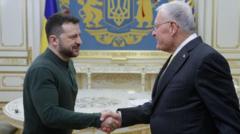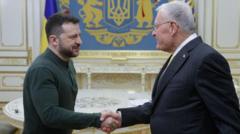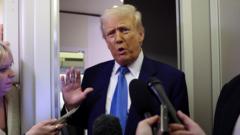The push for tariffs by the American president sends ripples of uncertainty through Europe's right-wing political landscape.
Trump's Tariff Threats Raise Concerns for European Nationalists

Trump's Tariff Threats Raise Concerns for European Nationalists
Nationalist parties in Europe face a precarious balancing act amid Trump's economic policies.
Standing in the rotunda, Italian Prime Minister Giorgia Meloni, a notable attendee of President Trump’s recent inauguration, embodies the complicated dynamics of European nationalism. While she shares many of Trump’s conservative values and cultivates a close relationship with his advisor, Elon Musk, there remains an undercurrent of caution. Many of her supporters anticipate that this alignment can enhance Italy's prominence and Meloni's influence on the European stage.
However, Trump’s inaugural words—"We will tariff and tax foreign countries to enrich our citizens"—carry implications that may overshadow any potential goodwill. His promise to prioritize American interests raises alarms among nationalist factions across Europe, extending beyond Meloni’s government. The specter of impending tariffs directed at European nations now looms over any celebratory sentiment from the right.
Leaders of nationalist parties in Europe, although aligned with Trump on several issues, brace themselves for the repercussions of his America First doctrine. This approach could pose threats to the very foundations of their agendas, emphasizing national interests at the expense of international partnerships. The dissonance between Trump’s aggressive trade tactics and the aspirations of Europe’s right could potentially alienate key voter bases that these parties rely on.
Moreover, Trump’s unpredictability allows for little certainty in international dealings, forcing European nationalist leaders to reconsider their strategies. As they advocate for prioritizing their nations, they must navigate the complexities of an American administration that may not always operate within the same realm of solidarity they envision for their countries.
In sum, the interplay between Trump and European nationalists is characterized by both shared goals and significant risks. With Trump’s tariff threats on the horizon, the right is positioned in a vulnerable spot, weighing the benefits of collaboration against the potential economic fallout.
However, Trump’s inaugural words—"We will tariff and tax foreign countries to enrich our citizens"—carry implications that may overshadow any potential goodwill. His promise to prioritize American interests raises alarms among nationalist factions across Europe, extending beyond Meloni’s government. The specter of impending tariffs directed at European nations now looms over any celebratory sentiment from the right.
Leaders of nationalist parties in Europe, although aligned with Trump on several issues, brace themselves for the repercussions of his America First doctrine. This approach could pose threats to the very foundations of their agendas, emphasizing national interests at the expense of international partnerships. The dissonance between Trump’s aggressive trade tactics and the aspirations of Europe’s right could potentially alienate key voter bases that these parties rely on.
Moreover, Trump’s unpredictability allows for little certainty in international dealings, forcing European nationalist leaders to reconsider their strategies. As they advocate for prioritizing their nations, they must navigate the complexities of an American administration that may not always operate within the same realm of solidarity they envision for their countries.
In sum, the interplay between Trump and European nationalists is characterized by both shared goals and significant risks. With Trump’s tariff threats on the horizon, the right is positioned in a vulnerable spot, weighing the benefits of collaboration against the potential economic fallout.






















